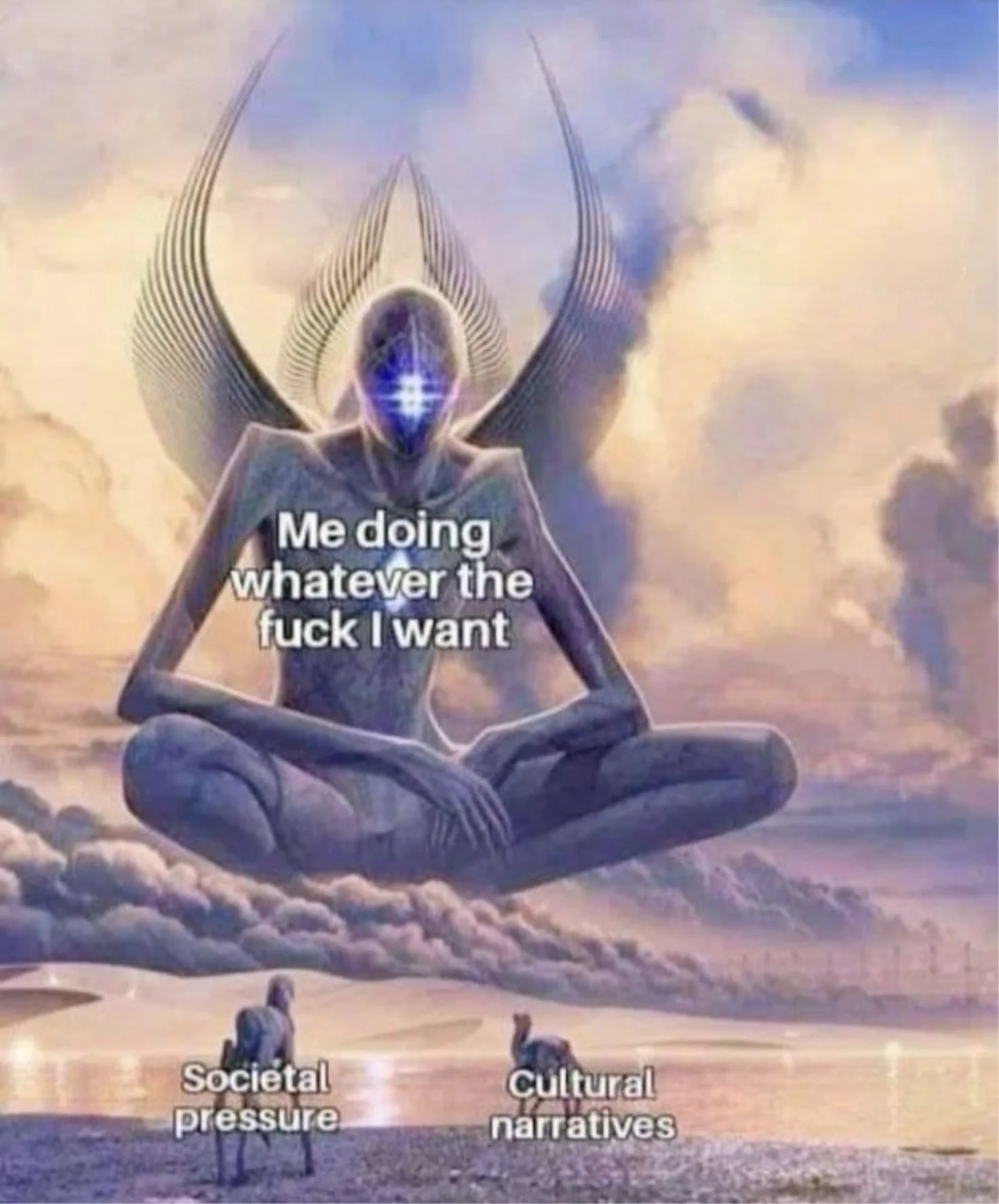06/19/2024
harnessing the power of our subconscious mind
on self-trust and doing whatever we want
I have been feeling a weird (good) sense of composure and calmness the last few days that I have never been able to keep for more than five minutes previously.
I know that this composure and self possession has come from this idea of letting go of anything I think I “should” be doing and only doing what I “want” to do. I believe a lot of it is about discernment – being able to discern what I like and what I don't like. Discerning my body’s needs from society’s expectations.
This has given me a new sense of intuition. I no longer feel the need to say things just to mask my true identity, which was often driven by a desire to be liked. As a result, I increasingly feel more and more that my sense of self is coming from a place of truth. That i actually genuinely believe the words that are coming out of my mouth. I feel more than ever that I can listen to my body and its needs, and face whatever is in front of me from a relaxed state. Because I am doing what I actually want to be doing in the moment, and not what I should be.
I notice that life, both day-to-day and zoomed out, reaches homeostasis naturally with time when I feel attuned. This is rooted in trusting that the subconscious, my subconscious, will tell me what it needs. That my body will naturally grow tired of netflix as long as I am listening and noticing through presence (1). It will know when it is time to do the dishes and when it’s time for a walk. My brain computer will register the urgent and the important and Eisenhower matrix (prioritize) automatically and naturally. I will know when it is time to work, read, study, and relax.
Allowing my subconscious to have the space, patience, and faith it needs to work.
Our job is to use our motor skills to lower the activation energy required to allow for the above to happen. I have been playing with both resisting and controlling my impulses in the name of discipline my entire life versus now following that sense of ease and intuition through presence.
Resistance to anything – emotions, needs, hobbies, curiosities, feelings, impulses – prevents our mind from learning about their consequences. So we do the things we think we should be doing. This thing, whatever it is, takes a path of resistance with immense friction (and not the kind that shows us our edges).
To find ease, we must embrace the uncertainty that comes with unexpected/scary/big feelings when we engage in actions with unpredictable outcomes. Human beings are afraid of uncertainty because we are usually not interested in the truth – we’re interested in the elimination of uncertainty, and that fact alone causes us to believe things and do things that other people tell us to do, or whatever the status quo is, or what is already known to work. But we also know that doing whatever it takes to close the uncertainty gap is a cowardly move, and it is not from a place of truth and authenticity.
These big feelings when uncertainty arises can be seen as signals. Signals that are trying to tell us something. They’re pointing us to things we need to address to reach equilibrium again. Equilibrium here means being at our most relaxed state, a state that provides ease. To be at our most relaxed state we must meet our needs, and our mental state has to be in homeostasis along with our physical.
If we abandon this fake discipline and do whatever we want all the time, it yields a composure that is much more robust than any superimposed self-control (2). We let the emotions get as big as they need. And instead of suppressing our needs, we let them get met, which results in that relaxed state that is difficult to find on the path of resistance. Suppressing our needs just elongates the process. We think we are optimizing for efficiency through this “discipline”, when we’re just making the process more painful. The path of joy evolves with our evolving needs, and discipline is not about not listening to our needs. It's about evolving as our goals and needs evolve. Discipline is useless if it cannot catch up to our personal growth. And if we refuse to admit our needs to ourselves, and if they conflict with our identity, the mind will find perverse, self-deceptive ways to satisfy those needs anyway.
Richard Feynman said to study hard what interests us the most in the most undisciplined, irreverent and original manner possible.
To do truly good work, we must truly follow our curiosities. Curiosity is an act of devotion to our intuition. The beginning of devotion is attention (3).
–
notes
I’ve written about noticing, presence, alignment in detail: https://www.aishwaryadoingthings.com/how-to-know-what-to-do
Much of this piece is inspired by Siddarth’s stuff i’ve learned #10
Mary Oliver said that attention is the beginning of devotion
